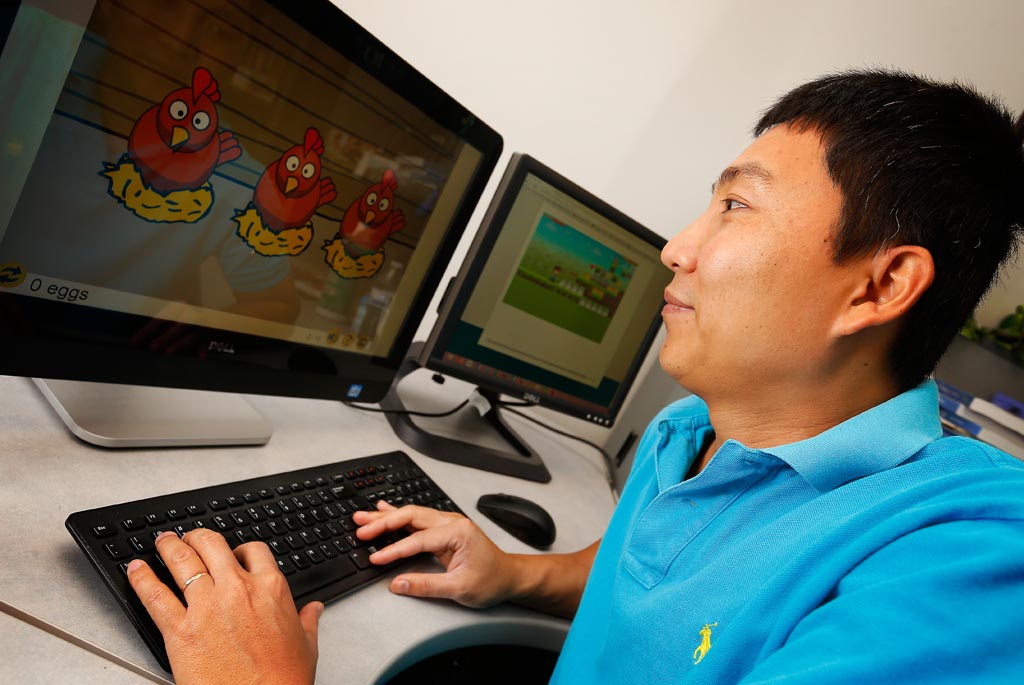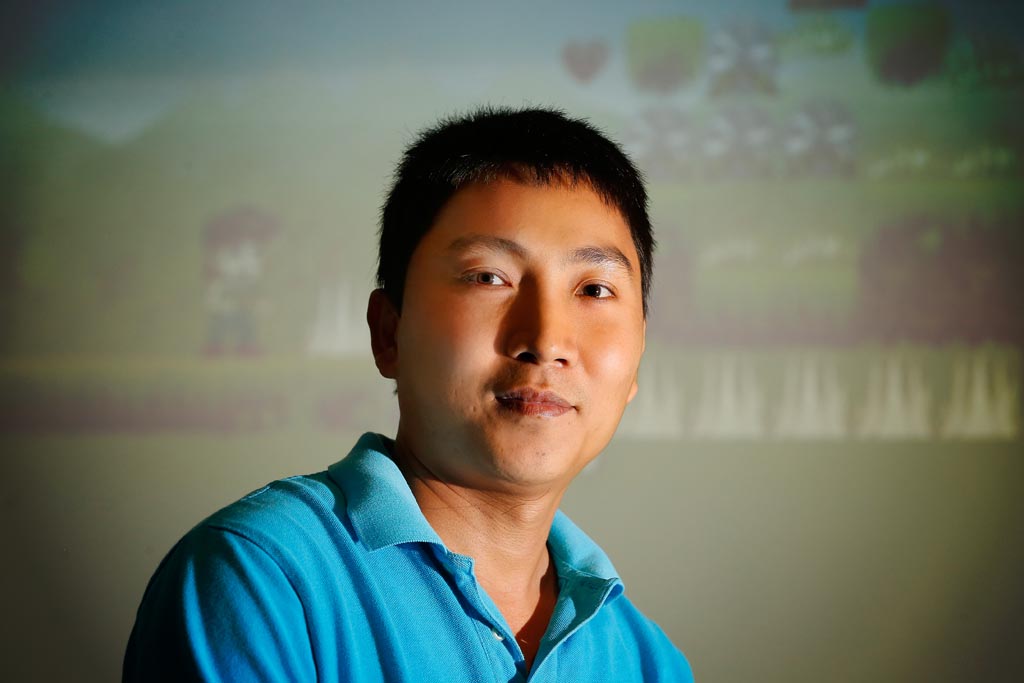As Phu Vu watched his young sons play video games, he realized that games might be the key to getting the attention of his college students.
“We all know that children and adults love to play games,” said Vu, an assistant professor of teacher education at the University of Nebraska at Kearney. “If we can implement the game strategy and principles into the classroom, students will feel more motivated to learn.”
At UNK, Vu teaches instructional technology online classes using game-based learning. Instead of reading textbooks, taking quizzes or doing assignments, students answer questions in an online game. Students can even view a leaderboard to determine who has the best score. The competition helps motivate students to work harder, Vu said.
“It’s a more effective learning tool for younger generations.”
Students studying teacher education are able to learn the content from Vu’s classes using games, and learn how to teach their future students using games.
“Technology is everywhere now. We have cell phones, iPads and more. Technology should be integrated into schools to improve student performance, behavior and academics,” Vu said. “We must follow the trends to educate the pre-service teachers to use technology effectively in their future classroom.”
Vu implemented game-based learning in his classes in his second semester at UNK – spring 2014. He learned about the cutting-edge teaching method at a conference and began conducting his own research.
The lack of research done on the topic has made teachers hesitant to integrate games into their online instruction, he said.
His study “Using Games in Online Education: Is it a Winning Strategy?,” which was published in the Online Journal of Distance Learning Administration, examined the impact of adding game elements on students’ performances in an online setting.
The study examined two online graduate level course sections – a treatment group and a control group. The classes had the same assignment requirements, but one class used game elements to supplement the lectures.
The findings indicated that more studies need to examine the impact of game-based learning on students’ academic performance and whether the nature of the assignments or subject areas make any difference in the impact of students’ grades.
However, Vu concluded that integrating games into online learning has the potential to help students achieve a higher degree of engagement in their online courses.
“My research interest is in game-based learning to promote student interest and engagement in the learning environment,” Vu said. “I want to motivate students to log in to class more often to promote student learning.”

TRAINING, HELPING OTHERS
While Vu has implemented game-based learning into his teacher education classes, he learned that many teachers don’t always have the technological resources or knowledge to use the technology in their classrooms.
His study, “Availability and Use of Digital Technologies in P-12 Classrooms of Selected Countries,” which was published in Issues and Trends in Educational Technology, examined what digital technologies were available and how they were used in classrooms in 14 countries across the world.
He found that technology differed in classrooms in developed and developing countries. Classrooms in the United States had more digital technology than other countries, but they did not use technology the most.
The study revealed that schools may have the funds to purchase technology, but they don’t always have the funds to hire people to help teachers with technology integration.
Vu is now researching how teachers with little or no technological expertise can create games.
“Introducing a gaming platform with a short training allows teachers to learn how to create games. It’s not a fancy game, but it’s a digital game they can create themselves based on the content of their classes,” Vu said.
Vu received a grant from Nebraska’s Coordinating Commission for Postsecondary Education to offer professional development to elementary teachers in Grand Island. Those teachers will learn how to use technology in their math classes.
Vu began his career in education as a high school teacher at the Nha Trang Gifted High School in Vietnam, where he is from.
He was offered a Fulbright Scholarship, the largest U.S. exchange program offering opportunities for students and young professionals to undertake international graduate study, advanced research, university teaching and primary and secondary school teaching worldwide.
Vu earned his master’s degree in English as a second language and his Ph.D. in curriculum and instruction at Southern Illinois University.
He then came to UNK.
His interest in becoming a teacher began when he was a child.
“I was inspired by my father, who was not a teacher but always talked about being a good teacher and providing good education to children.
“When I was a child, we were living in a poor neighborhood, and the only way to get out of poverty was to get a good education. That’s why a lot of families in Vietnam sold their homes or belongings, in order for their kids to go to college.”
Getting a college education wasn’t common – only two in Vu’s elementary school class earned college degrees.
“It was an investment. I’m the only one in my extended family who graduated from college. And I got a master’s degree and a Ph.D.”
To give back to his home country, Vu provides professional development opportunities to teachers.
In 2013, he received a grant from the United States Embassy to create a professional learning network for Vietnamese teachers. In its first year, 150 elementary and secondary teachers took part in the online training. In its second year, 82 teachers participated. The program is now in its third year. He has received another grant to continue the program.
His work creating an online professional development network led him to conduct a study on the factors that drive learner success in online professional development.
His study, published in July 2014, found that self-discipline, school administrators’ expectations, students’ ability to learn with limited support, course login frequency, familiarity with technology and the ability to self-manage a timeline were the main factors that led to the successful completion of online professional training courses.
The study was published in the International Review of Research in Open and Distance Learning.
“I think the combination of teaching and doing research is what I like most about my work,” Vu said. “Most of my research ideas are from my own classrooms. They are more like design-based research in which I tested new teaching ideas or designed the class in different ways and observed how those ideas or designs worked.
“So far, both my teaching and research benefit each other. What I found in my research really helped improve my teaching, and what I did in my teaching gave me new ideas to do research.”
As a new professor just getting started in research, Vu says he is still working to identify his research interests and discovering his areas of expertise.
“I have a curiosity and passion to discover new things. I do research to find the answers to specific questions I had either in my teaching or in my field,” Vu said.
“Some of my research projects sounded irrelevant to many researchers and educators, but I did them to test my teaching theory and ideas. You may be surprised to know that I had many research unpublished or technically unaccepted, but I am happy with what I did because what I found really informed my teaching.”
 Phu Vu
Phu Vu
Title: Assistant professor, Teacher Education
College: Education
Education: Ph.D., curriculum and instruction, Southern Illinois University Carbondale, 2010; Master of Arts, Teaching English as a Second Language, Southern Illinois University, 2010; Bachelor of Arts, Teaching English as a Second Language, Quy Nhon University, 2000.
Years at UNK: Two
Career: High school teacher, Nha Trang Gifted High School, Vietnam.
Family: Wife, Lan, current Ph.D. candidate at Southern Illinois University Carbondale. Sons Andy, 11, and Nam, 4.
Hobbies/Interests: Fishing, playing tennis
Areas of research/specialization: Online learning, Game-based learning, Technology integration.
Courses taught: Instructional technology and preservice teacher, Technology tools for teachers, Distance Education, Educational Telecommunications.
Recent Published Articles:
– “Using Games In Online Education: Is It A Winning Strategy?” Online Journal of Distance Learning Administration, 2014.
– “Ring Of Engagement: A Model For MOOC Enrollment,” Journal of Global Literacies, Technologies, and Emerging Pedagogies, 2014.
– “Factors Driving Learner Success In Online Professional Development,” International Review of Research in Open and Distance Learning, 2014.
– “Availability And Use Of Digital Technologies In P-12 Classrooms Of Selected Countries,” Issues and Trends in Educational Technology, 2014.
– “When To Talk, When To Chat: Student Interactions In Live Virtual Classrooms,” Journal of Interactive Online Learning, 2013.
-30-



Amazing article, we should always work to make education fun for students. This will be helpful in making a longer impact on their mind about the realities and facts of the world. Good Work!!!